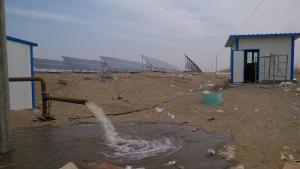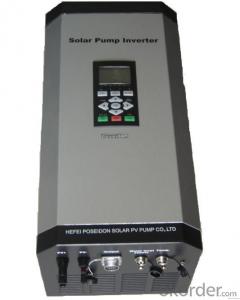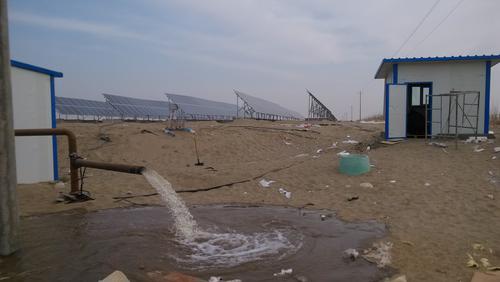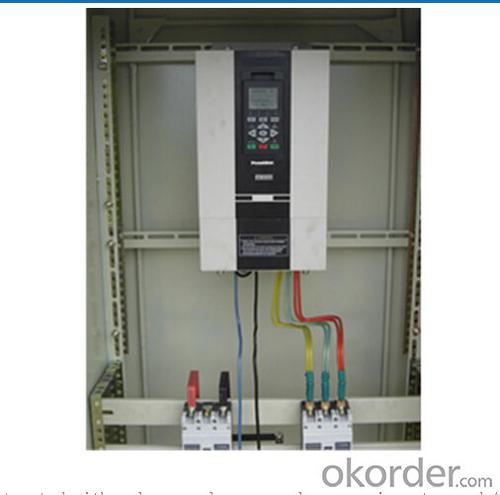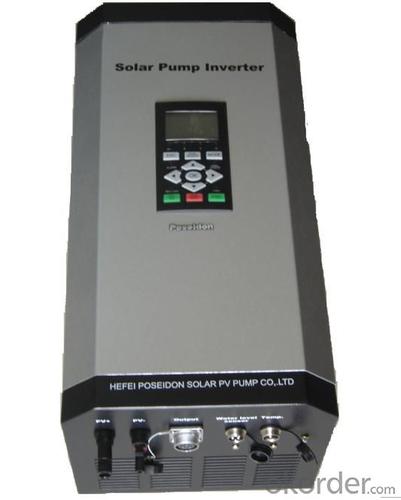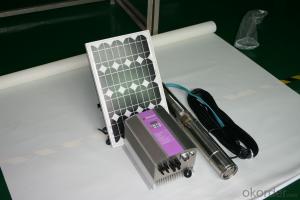Smart Solar Pump FCPM110KH Inverter
- Loading Port:
- China Main Port
- Payment Terms:
- TT OR LC
- Min Order Qty:
- -
- Supply Capability:
- -
OKorder Service Pledge
Quality Product, Order Online Tracking, Timely Delivery
OKorder Financial Service
Credit Rating, Credit Services, Credit Purchasing
You Might Also Like
Solar pump inverter FCPM110KH Product Description:
Solar water pumping system is constructed with solar panel array,solar pump inverter and AC water pump, DC current produced from solar panel will be delivered to solar pump inverter,and it will convert it into AC current to drive water pump,and will automatically regulate output frequency according to sun radiance intensity,maximally realize MPPT tracking function.
Features
Adopting the proposed dynamic VI maximum power point tracking (MPPT) control method, with fast response, and reliable operation, achieves efficiency of 99%.
Designed with variable frequency driver, greatly improves efficiency
Extremely high efficiency
Digital mode control, with automatic operation and manual operation mode options
Complete protection functions
Adopts intelligent IPM module, with high reliability
LCD display and operation panel, in real time presents operating data
Optional for water level measurement and control circuit
Applicable for general ACC pumps, like centrifugal pump, piston pump etc.
Independent intellectual property; Highly effective, the redundant reliability, exempts the maintenance and the long life.
The pumps are soft started, fully protected.
No batteries are used. So better Sunlight, more water.
Datasheet.
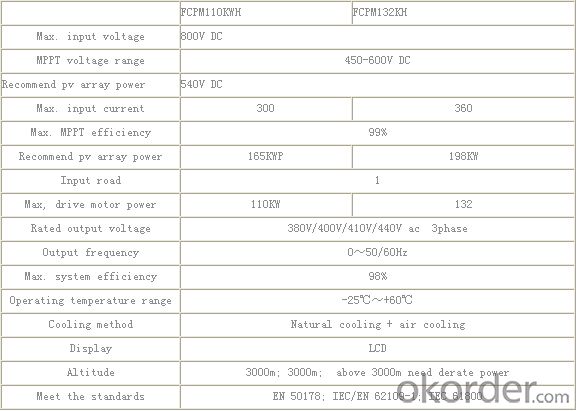
- Q: Can a solar pump be used for water supply in mining operations?
- Yes, a solar pump can be used for water supply in mining operations. Solar pumps are a reliable and cost-effective solution for providing water in remote locations where access to electricity may be limited. They can be used to extract water from wells, rivers, or other water sources, and can be easily integrated into mining operations to ensure a sustainable and efficient water supply. Additionally, solar pumps are environmentally friendly, as they utilize renewable energy, reducing the carbon footprint of mining activities.
- Q: Can a solar pump be used for rainwater harvesting systems?
- Certainly, a solar pump is perfectly suitable for rainwater harvesting systems. Solar pumps provide a superb alternative to conventional electric or diesel pumps due to their utilization of renewable energy and lower operational expenses. By employing photovoltaic panels to convert sunlight into electricity, solar pumps efficiently extract water from the rainwater harvesting system. Their reliability, efficiency, and eco-friendliness make them the perfect option for rainwater harvesting systems. Furthermore, they can be effortlessly integrated into current rainwater harvesting arrangements or installed as independent systems. In conclusion, the utilization of a solar pump in rainwater harvesting can greatly enhance the system's effectiveness and sustainability.
- Q: Can a solar pump be used for water supply in aquaculture farms?
- Yes, a solar pump can be used for water supply in aquaculture farms. Solar pumps are a sustainable and cost-effective solution for providing water to aquaculture farms, as they utilize solar energy to power the pump and do not rely on electricity from the grid. This helps reduce operational costs and environmental impact. Additionally, solar pumps can be easily integrated into existing aquaculture systems, providing a reliable and efficient water supply for the farms.
- Q: How does a solar pump handle water source depletion or drought conditions?
- A solar pump does not have the ability to handle water source depletion or drought conditions on its own. However, certain measures can be taken to mitigate the impact of these conditions. For example, the pump can be connected to a water storage tank or reservoir, allowing excess water to be stored during periods of abundance and used during times of scarcity. Additionally, implementing efficient water management practices such as drip irrigation or rainwater harvesting can help conserve and optimize the use of water resources.
- Q: Are there any restrictions on the use of a solar pump in residential neighborhoods?
- Depending on local regulations and homeowner association rules, there could be limitations on using a solar pump in residential neighborhoods. To ascertain if there are any particular restrictions or prerequisites for utilizing a solar pump, it is crucial to verify with the local authorities or neighborhood association. Prospective restrictions might encompass noise constraints, limitations on height, or considerations of aesthetics. Furthermore, obtaining permits or approvals may be obligatory before installing a solar pump in a residential vicinity. It is always prudent to seek advice from the pertinent authorities or neighborhood association to guarantee conformity with any existing restrictions or guidelines.
- Q: How do I protect a solar pump system from lightning strikes?
- To ensure the longevity and functionality of your solar pump system, it is crucial to protect it from lightning strikes. Below are several steps you can take to safeguard your system: 1. Implement a lightning protection system (LPS): A well-designed LPS will redirect lightning strikes to the ground, effectively shielding your solar pump system. This typically involves the installation of lightning rods at the highest points of the system, which are then connected to a grounding system. 2. Establish proper grounding: It is important to ensure that your solar pump system is adequately grounded. This entails connecting all metal components to a grounding conductor that leads to an appropriate grounding electrode, such as a grounding rod. Proper grounding aids in dissipating the electrical charge from lightning strikes. 3. Utilize surge protection devices (SPDs): Incorporating surge protectors in your system will absorb and redirect voltage spikes caused by lightning. SPDs are specifically designed to handle large electrical surges and prevent damage to sensitive equipment. 4. Employ shielding and bonding techniques: Shielding involves the installation of conductive materials, such as metal sheets or mesh, around vulnerable components to divert lightning strikes away from them. Bonding, on the other hand, involves connecting all metal components together to create a continuous conductive path, thereby reducing the risk of damage from electrical potential differences. 5. Disconnect during storms: It is advisable to disconnect your solar pump system from the power source and turn it off whenever a thunderstorm is approaching. This precautionary measure minimizes the risk of damage during a lightning strike. 6. Regularly maintain your system: Ensure that your solar pump system undergoes regular inspections and maintenance. Check for loose connections, damaged wiring, or any other potential vulnerabilities that may increase the risk of damage from lightning strikes. Promptly repair or replace any faulty components. It is important to note that while these measures significantly reduce the risk of damage from lightning strikes, they do not guarantee 100% protection. In extreme cases, it may be necessary to consult with a professional electrician or engineer to develop a comprehensive lightning protection system tailored to your specific needs.
- Q: Can a solar pump be used for water supply in green buildings or eco-resorts?
- Yes, a solar pump can definitely be used for water supply in green buildings or eco-resorts. Solar pumps are an environmentally friendly and sustainable solution as they rely on solar energy to power the pumping mechanism. This reduces the carbon footprint and dependency on fossil fuels. Additionally, solar pumps can be integrated with rainwater harvesting systems to further enhance water conservation efforts in these eco-friendly establishments.
- Q: Can a solar pump be used in areas with high humidity or precipitation?
- Yes, a solar pump can be used in areas with high humidity or precipitation. The performance of a solar pump is not significantly affected by humidity or precipitation. As long as there is sufficient sunlight, the solar panels will generate electricity to power the pump, regardless of the weather conditions. In fact, areas with high humidity or precipitation can be beneficial for solar pumps as rainfall or moisture can help keep the solar panels clean, thus ensuring optimal energy production. Additionally, solar pumps are designed to be weather-resistant and can withstand various climatic conditions, including high humidity and precipitation. Therefore, they can be effectively used in such areas for various applications, such as irrigation, water supply, or even wastewater management.
- Q: Can a solar pump be used for geothermal heating and cooling?
- Geothermal heating and cooling systems rely on the earth's core for their heat source, whereas solar pumps are not equipped to tap into this geothermal energy. Solar pumps are designed to use solar energy for powering various applications, but they are not specifically designed for geothermal purposes. While solar energy can be utilized in certain components of a geothermal system, it cannot substitute the essential geothermal heat exchange process that these systems depend on.
- Q: Are there any limitations to the type of control system that can be used with a solar pump?
- Yes, there are limitations to the type of control system that can be used with a solar pump. One limitation is the availability of sunlight. Solar pumps rely on solar panels to generate electricity, so if there is insufficient sunlight, the pump may not work optimally or at all. Additionally, the size and capacity of the solar panels also impact the pump's performance. Other limitations include the need for proper installation and maintenance, as well as the compatibility of the control system with the specific solar pump model. Overall, while solar pumps offer sustainable and efficient water pumping solutions, their control systems are subject to certain limitations.
Send your message to us
Smart Solar Pump FCPM110KH Inverter
- Loading Port:
- China Main Port
- Payment Terms:
- TT OR LC
- Min Order Qty:
- -
- Supply Capability:
- -
OKorder Service Pledge
Quality Product, Order Online Tracking, Timely Delivery
OKorder Financial Service
Credit Rating, Credit Services, Credit Purchasing
Similar products
Hot products
Hot Searches
Related keywords
